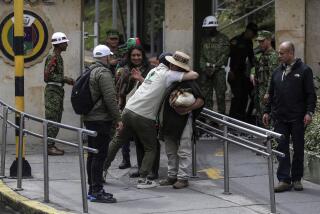Yemeni plane crash survivor tells father: ‘Daddy, I don’t know what happened’
- Share via
CAIRO AND PARIS — The 14-year-old girl believed to be the lone survivor of a jetliner crash in the Indian Ocean was thrown from the plane and into the waves, where she heard voices but saw no one in the darkness, her father told a French radio station Wednesday.
“She is a very, very shy girl. I never thought she would survive like that,” Kassim Bakari said of his daughter, Bahia, in an interview with French RTL radio from his suburban Paris home. “I can’t say that it’s a miracle. I can say that it is God’s will.
“When I had her on the phone, I asked her what happened and she said, ‘Daddy, I don’t know what happened, but the plane fell into the water and I found myself in the water . . . surrounded by darkness. I could not see anyone,’ ” Bakari said.
Bahia, who clung to floating debris for about 12 hours in the cold sea, was in stable condition at the El Maarouf Hospital in Moroni, the capital of Comoros. The Yemenia airlines Airbus A310 was approaching the island nation Tuesday with 153 people aboard when it went down.
Rescue workers and French and U.S. search planes scoured the area north of Comoros on Wednesday for more survivors; debris was scattered for miles across the ocean.
The French government announced early Wednesday that search teams had picked up a signal coming from one of the plane’s “black box” recorders. But it later reversed that assertion, saying the electronic impulses detected were from the plane’s distress signals. A plane’s cockpit voice recorder and flight data recorder are crucial to determining what caused a crash.
French army spokesman Christophe Prazuck said the recorders probably were several hundred yards beneath the ocean’s surface and “inaccessible to human divers.”
The Yemeni government said preliminary indications were that bad weather may have caused the airliner to plunge into the sea as it approached the airport in Moroni.
Flight 626 had left the Yemeni capital, Sana, carrying mostly Comorans and French nationals. Many of them had originated their journey in Paris and flown to Marseille before changing aircraft in Sana.
European aviation officials have said that the plane operated by Yemenia, the national carrier of Yemen, was barred from French airports two years ago after “irregularities” were discovered in a safety review. A European Union official said the airline last year had passed safety requirements and was not blacklisted in Europe.
Anger at the carrier continued at Charles de Gaulle Airport in Paris among young protesters, many of them of Comoran descent, who tried to block passengers from a Yemenia flight. French news media reported that about 60 passengers did not check in but that the flight departed with 100 passengers.
Comoran Vice President and Transport Minister Idi Nadhoim scolded French authorities for not warning Comoros about the Airbus A310’s questionable safety record.
“I wish the French could have informed us about any irregularities with this plane,” he said in a telephone interview with France 24 television. “What is this? Discrimination between French passengers that have to be protected in France and those French people who are left to fly in these kinds of planes?”
Bahia Bakari’s story was told with fascination from Comoran villages to towns across France. She has a broken collarbone and cuts on her face, and, according to a rescue worker who jumped into the sea to save her, she could barely swim and was too weak to hold on to a buoy thrown to her from a boat. She was draped in blankets and given sugary hot water to drink.
“She clung to a piece of debris from the plane for 12 hours,” French Cooperation Secretary Alain Joyandet told France Info radio. Later in the day he told reporters she was en route home to Paris. “She signaled to a passing boat, and it was able to pick her up. She really showed incredible physical and moral strength.”
Bahia boarded the doomed plane with her mother; the two were traveling to Comoros to visit relatives. Her mother, like the rest of the passengers, is presumed dead, but Bahia doesn’t know this.
“When I spoke to her she was asking for her mother,” Kassim Bakari said.
“They told her she was in a room next door, so as not to traumatize her. But it’s not true. I don’t know who is going to tell her. . . . I can’t tell her that.”
--
Lauter is a special correspondent.
More to Read
Sign up for Essential California
The most important California stories and recommendations in your inbox every morning.
You may occasionally receive promotional content from the Los Angeles Times.











